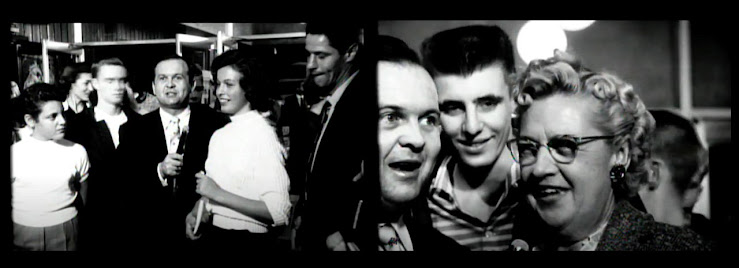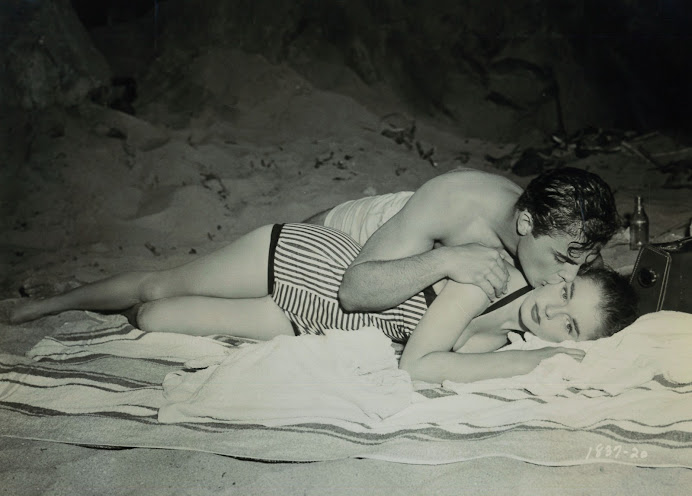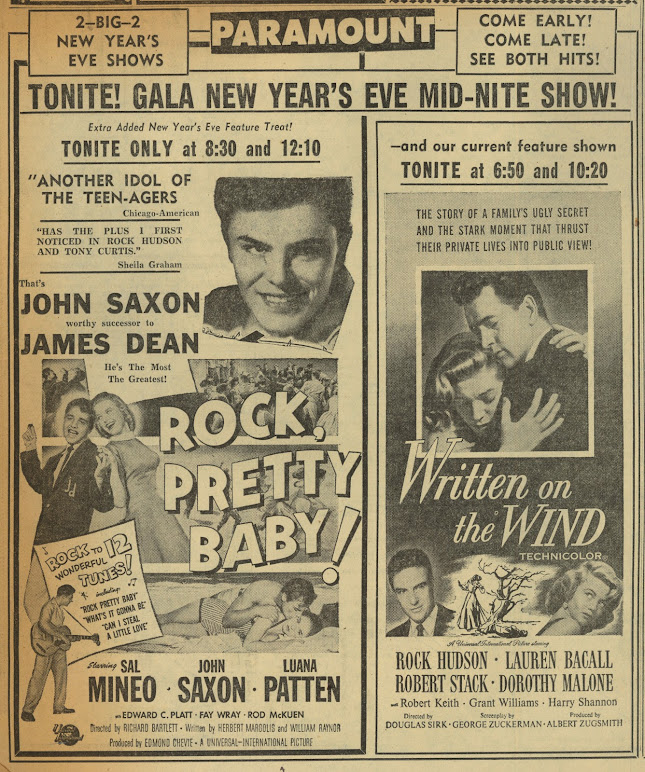Overnight Star In the Making?
1956 Pretty Babies Rock to Rock, Pretty Baby
Night of November 7, 1956: D.J. favorite Johnny Grant asks outgoing teens, and moms of teens, “What did you think of Johnny Saxon?” Universal-International was inspired by response to put together a reel’s worth of viewer comments for exchange use in all states, the short tabbed for trade screenings with Rock, Pretty Baby. Could this be an R&R sleeper to leave others in boxoffice shade? We know Rock, Pretty Baby, if at all, from sharp images (check eBay) and cloudy transmission via You Tube. Oh for a Kino release, but has Universal even done a High-Def transfer? It’s not as though Rock, Pretty Baby had importance, because, no, John Saxon was not another James Dean, despite ad assurance he was, and music such as there was (songs, but ordinary ones), plus teen angst re parents and how latter fail too often to understand, or more specifically, fail to come through with $300 to finance a boss guitar. Shades of Rebel Without a Cause were here, Sal Mineo first-billed, though his part was junior to Saxon’s, latter the bigger (and contract-bound) push by U-I. Then there was Edward C. Platt as obtuse dad, him formerly the police dick that taught Dean a thing or two in Rebel. Veterans were on hand, young and old, ingenue lead Luana Patten around since service for Disney in the mid-forties and ongoing from there, George Winslow erstwhile “Foghorn” for kid parts at Fox. Shelley Fabares was coming up as adolescent support, later to co-play with Elvis and countless elsewhere teen work. Rock, Pretty Baby spots even Fay Wray as muddled mom, and we wonder if any of youth cast caught her King Kong in 1956 reissue or one of pioneer broadcasts on RKO General stations that took place while Rock, Pretty Baby was in production.
Like any distributor, Universal wanted a youth picture that would break into a million-dollar rentals class. That needed crossover into Rebel and Blackboard Jungle territory, both immense grossers and taken with issues deeper than what Rock, Pretty Baby explored. U-I’s “newsreel” finds grown-ups endorsing the film in accompany of offspring, which you could ask why unless to monitor or inspect the show for cleanliness, which Rock, Pretty Baby very much was what with Saxon and friends well-behaved with safe “ballads” woven into their band repertoire. This was not Rebel/Blackboard intensity, but Andy Hardy updated with no conflict or misunderstanding that could not be ironed out within ninety minutes. Universal like others as hidebound thought what was needed was conciliatory entertainment a whole family could see and not quarrel over. Teens however could smell such ruse and leave it alone, “Johnny Saxon” or not. What made U-I imagine he could be another James Dean? The original had been gone less than fourteen months and no duplicate had yet been found for him. Elvis came closest and was hot upon streets with his first, Love Me Tender, playing to kid mobs the very night, plus surrounding ones, around Baby’s Encino preview. Universal had plenty reason to think Saxon would click on Dean terms, for there had lately been The Unguarded Moment, where JS was a troubled teen after JD fashion, the picture with its rape theme, a schoolteacher played by Esther Williams, hopefully a magnet for adult patronage plus youth allured. Rock, Pretty Baby was bland follow-up beside this, though Saxon would go an approximate Dean direction, if watered down and aimed more at romantic support in adult-driven product. He’d even work for director Vincente Minnelli at MGM, second tier pairing with Sandra Dee while Rex Harrison and Kay Kendell took leads. Would James Dean or handlers have stood for this?
Tip-off to Universal’s aim was clean teens exiting Encino auditorium into Johnny Grant’s lobby embrace. No surly or slouchers in this crowd, none with “attitude,” which we may assume were culled by U-I during edit process, though for crowd shots shown, maybe the whole lot was clean-cut and nicely behaved. Even little brothers/sisters came along, much like “Foghorn” and Shelley Fabares’ “Twinky” in the film. Universal staff plus creatives had been taught to a man/woman that it was a big tent industry sought to fill. Rebel Without a Cause and Blackboard Jungle defied those rules and it paid, but to alienate segments of your audience further? That was chancing things too much, undermining whole segments' comfort with moviegoing. To aim entertainment at teens to exclusion of parents and younger siblings was planting toadstools at entrance doors. Maintaining welcome mats for all forced blandness upon product like Rock, Pretty Baby, plus there still being a Production Code and Legion of Decency to cope with. These sorts of compromise were what kept ambitions low for youth-aimed output, at least output that would appeal to youth and mollify parents. Such cheapies all, whether rock/roll, sci-fi, juve delinquent, kept horns pulled and gored nobody with content beyond what posters and trailers showed. Kids had memorized cheat sheets and knew limit of thrills they’d get. In fact, most were by now used to laughing at films so resolutely not delivering what was promised by promos. An age of irony, incubating at least since the war, would burgeon upon alter of product presuming to “speak” to youth.
U-I was determined that Rock, Pretty Baby be the exception, Encino glimpse whispering it would be. 16mm they shot using the Johnny Grant interviews seems sincere in the capture of crowd satisfaction. Rock-roll was obviously a hit on radio and records, but a ghetto for movies except what Elvis had geared up and a pair of Pat Boones soon to unveil for Fox. Boone however was for ballads and good behavior parents not only endorsed but went with their children to see. Rock, Pretty Baby was for tickling that vibe. Season rivals included down-dirty Rock! Rock! Rock! from independent DCA, but well exploited, plus another from Sam Katzman, Don’t Knock the Rock, a show world recalling how he cracked a million in rentals with Rock Around the Clock, a venture that cost him and Columbia mere dimes. Sort of like 3-D in that big studios wanted their offerings to be “exceptions” to a rule of cheap-and-grab, Universal putting plush (for them) to Rock, Pretty Baby and sending cast members for nationwide touring in December, Sal Mineo and John Saxon to Detroit for the US premiere, then Mineo to the Butterfield circuit in Michigan, Saxon visiting Omaha, Des Moines, then Charlotte and New Orleans. Effort yielded $1.430 million in domestic rentals (Variety estimate), good for a sequel, Summer Love, with most of cast members reunited. This was money aspiring to Elvis/Pat Boone, if a million or so below their level, yet John Saxon was a find, and belonged to Universal. Latter showed how to play R&R to tune a wider audience would embrace, and if this was hollow recital of Big Beat, then let it be so, long as caution-first Mom and Dad plus clean teens supported effort past a million mark.
Griff sends along Gotham saturation ad for combo engagement of Summer Love with The Big Beat:












15 Comments:
I don't think of James Dean as a playing a "romantic lead" in his three movies, but that appears to be how they were pitching John Saxon. That's an odd way to go about it if U-I management really were trying to find "the next James Dean".
Excellent comment, Filmfanman.
Rock'n roll was novelty music, like boogie-woogie and the Latin dance crazes, right up until Feb 9 1964. The movie studios and major labels saw there was a huge opportunity there, but simply wanted to cash in until the fad faded like all the others, so they never took it seriously. Elvis scared them, but Col. Parker and the U. S. Army took care of that. It made perfect sense that Universal thought they could stamp out a Dean clone and throw a few "rock" songs at him and rake in the dough. That's how it had always worked before.
HI, John -- You're leaving out THE BIG BEAT, which was really U-I's second rock-and-roll feature. Bigger names (Fats Domino, The Del Vikings, The Diamonds), and in color, with Will Cowan of Universal's musical shorts directing. The IMDB says SUMMER LOVE wasn't released until June 1958, a year and a half after ROCK, PRETTY BABY! Going by the IMDB dates, it appears that U-I held SUMMER LOVE back and released THE BIG BEAT first, in February 1958.
The trades say that U-I released THE BIG BEAT and SUMMER LOVE together, in April 1958, with THE BIG BEAT playing topside. That makes more sense to me, given U-I's flair for showmanship.
Griff offers playdate data and forwards a combo ad for SUMMER LOVE and THE BIG BEAT:
Dear John,
Scott MacGillivray is probably on target about how U sold THE BIG BEAT and SUMMER LOVE. I note that the combo seems to have hit New York City a bit later than other cities, opening on the RKO circuit (with SUMMER at the top of the bill) on June 25, 1958; the Times referred to the pairing of the two pix as a "bargain bill."
I have never seen THE BIG BEAT. I notice that both the IMDb and the AFI Catalogue assert that this went out theatrically at a 2:1 aspect ratio. I had thought that Universal had stopped doing crazy things like that by '58.
Regards,
Griff
I doubt if any of the executives at Universal, or any members of the audience would have guessed that Rod McKuen, whose name came last in the cast list on the movie poster, would go on to become the most famous poet/songwriter in the country. He sold 60 million books, 100 million records, appeared at countless sold-out concerts, had his own TV specials. Frank Sinatra even recorded an all-Rod McKuen album. He's totally and deservedly forgotten now, but at his peak, in the late 60s and 70s, he was popular all over the world. Certainly more famous than John Saxon or Sal Mineo.
I remember John Saxon mostly from his Bruce Lee movie and from Brando's THE APPALOOSA. I always liked him and guess he had a modest career as a character actor.
Re Rod Mckuen being "totally and deservedly" forgotten. Why deservedly, Tom? I never knew much about him, or heard his music growing up, so I'm just curious as to why he would be so obscure now.
Rod McKuen was, to put it kindly, of his time. Go to YouTube and type in "Rod McKuen poetry" and you can listen to him reading some of his poems. One can hear the appeal they must have had in the 70s to people wanting to feel warm and mellow. But today they sound like someone reciting a Hallmark greeting card--sort of the poetic equivalent of a Thomas Kinkade painting.
Yes, that was sort of my impression from what little I saw of him back in the day. Guess he knew at least how to make warm and mellow pay.
Movies like this didn't speak to teens. They spoke AT them. Like, "Forget that electric guitar and pick up an accordion! The girls LOVE accordions!" No offense to accordion players.
Becoming curious about this unknown-to-me Rod McKuen person, I see the wikipedia article about him says he wrote the lyrics for the Terry Jacks song "Seasons In The Sun", which was a big radio hit in the 1970s when I was a kid.
I guess McKuen wasn't quite as unknown-to-me as I had thought. Also proves to me that you can learn something new every day.
You can listen to "Seasons In The Sun" here:
https://www.youtube.com/watch?v=YG9otasNmxI
Griff offers up info re Rod McKuen:
Dear John:
Filmfanman is correct -- Rod McKuen did write the English lyrics for "Seasons in the Sun."
Jacques Brel wrote the song "Le Moribond" (roughly "The Dying Man") in 1959; McKuen translated and adapted (and to an extent, rewrote) Brel's French lyrics, preserving the Belgian songwriter's melody, and re-titled the song "Seasons in the Sun." The Kingston Trio recorded the Brel/McKuen song in 1964. Some years later, Canadian artist Terry Jacks heard the Kingston Trio's recording of the song and decided to cover it; it was a big AM radio hit for Jacks in 1974.
In addition to his songs, albums and many books of poetry, McKuen composed songs and scores for a number of films, including JOANNA, THE PRIME OF MISS JEAN BRODIE, A BOY NAMED CHARLIE BROWN (the first "Peanuts" feature film) and SCANDALOUS JOHN. He wrote lyrics for (and performed on the soundtrack) Henry Mancini's songs for ME, NATALIE. "Jean," the theme from MISS JEAN BRODIE (probably his best remembered song), was a hit for pop singer Oliver in 1969 and was nominated for an Oscar.
Yes, a lot of people mocked his poems -- the National Lampoon skewered him pretty well with a skillfully written parody, "Listen to the Drivel" -- and at least one pundit gibed, "If Rod McKuen is America's best-selling poet... well, maybe that's the kind of poet America deserves!"
But McKuen was an interesting guy and had something of a sense of humor about his success. As a guest on talk shows, he was surprisingly friendly, down-to-earth, unpretentious. In some ways, he still seemed like the "regular" guy who played Ox in ROCK, PRETTY BABY!
Regards,
-- Griff
Phil Smoot saw John Saxon at work, and here's his look-back:
He was one of the first stars I saw the first time I was in Los Angeles - - 1980.
The people I was staying with knew Richard Davalos (East of Eden) and wanted to go talk to him on the set of "Battle Beyond the Stars". John Saxon was there, and when we walked in, a crew member was sitting in his chair. The crew member jumped up when he saw Saxon enter, but Saxon assured him that it was alright for the crew member to sit in his chair and take a break. I thought "nice guy."
Thought that again 20 years later when he was in a movie that I was line producing in Los Angeles. We were doing a scene in a place that we had a hard exit and had to be out of by X time in the evening. The director was insisting that he had to have more time and wanted more setups. I told him can't happen. He started to get that "can't do it" attitude, and I told him how to do it.
As the director opened his mouth again to object, Saxon cut him off and said, "hell yeah, I've done that many times — set the camera up and keep it running and get my close-up and that actors close-up and swing it around and get that actor's close-up. So what are we talking about? Let's get in here and do it and get out of here!" He walked off onto the set and took his place and the director followed Saxon's lead - - Yep, my kind of actor. Knew the business.
- Phil
John Saxon is one of those reliables, like Richard Jaeckel. Maybe not A-list, but always there for a good performance. They never wore out their welcome, and man, they ALWAYS had work!
Post a Comment
<< Home